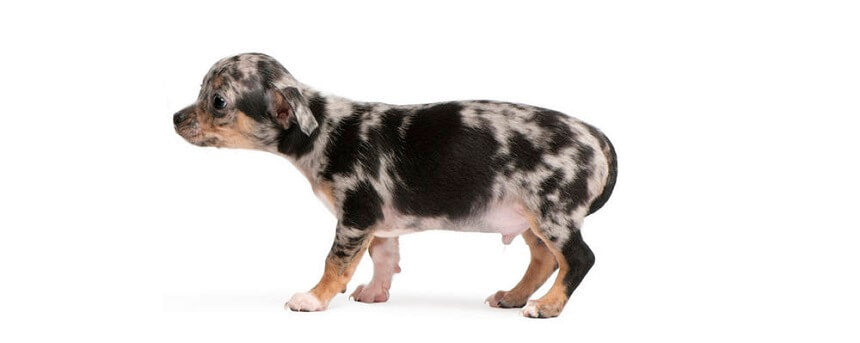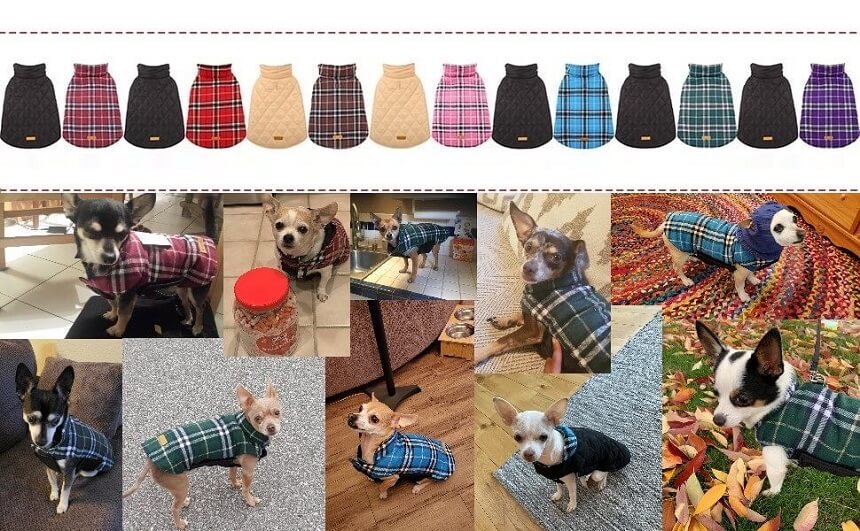13 Types of Chihuahuas: Body, Head, and Coat Styles
As we know, the Chihuahua is a popular pet that is often the center of attention. So while some people think they know what a Chihuahua looks like, they may be confused when they come across a different characteristic they never knew existed. In this article, you will find all the information you need about official and unofficial Chihuahua types.
Types of Chihuahuas: Quick Facts
- Short Hair Chihuahua
- Long Hair Chihuahua
- Apple Head Chihuahua
- Deer Head Chihuahua
- Pear Headed Chihuahua
- Teacup Chihuahua
- Fawn Chihuahua
- Merle Chihuahua
- Hairless Chihuahua
- Chihuahua Terrier
- Chiweenie Chihuahua
- Chilier Chihuahua
- Chorkie
The History of Chihuahua
Along with the Boxer, Schipperke, and Standard Schnauzer, the Chihuahua was recognized by the AKC in 1904 and is its 54th breed.
The breed derives its name from the Mexican State of Chihuahua, where the earliest specimens of the breed were found. Refer to AKC.
| Breed | Chihuahua |
| Temperament | Charming, Graceful, Sassy |
| Height | 5-8 inches |
| Weight | Not exceeding 6 pounds |
| Life Expectancy | 14-16 years |
"According to a poll by the American Kennel Club, the Chihuahua ranks 33rd out of 197 popular breeds. that's popular!"
Official Chihuahua Type
Short Hair Chihuahua
This type of Chihuahua is also known as the Smooth Coat Chihuahua. The American Kennel Club officially recognizes them. A short, smooth coat characterizes this breed. However, short hair Chihuahuas can also shed a lot of hair.

Long Hair Chihuahua
This Chihuahua is similar in weight, size, and body type to the short hair Chihuahua. The long hair Chihuahua's long, fluffy, silky touch and beautiful appearance make it a unique breed with a special appearance. They require more grooming.

Unofficial Type
Apple Head Chihuahua
Apple head Chihuahuas are so-called because of the domed shape of their head-it's almost exactly like an apple! Because of this shape, they have more prominent eyes than other Chihuahuas, shorter noses, and smaller bodies.
Their legs also tend to be shorter and "stubbier."
Unfortunately, due to the breeding methods used in the past, this type of dog can develop hydrocephalus or hydrocephalus. If you are looking to purchase an apple-headed Chihuahua, it is best to check to see if this condition occurs in the home.

Deer Head Chihuahua
Compared to the apple head Chihuahua, the deer head Chihuahua has a very narrow lead, longer nose, and longer legs.
Unlike the apple head Chihuahua, the deer head Chihuahua is not allowed to enter dog shows because of the size and shape of its head. The round head shape is popular in the show ring.
Deerhead Chihuahuas are called "deer heads" because of the shape of their heads, their large black eyes, and (often) their brown color.
With these features, they look like baby deer.

Pear Head Chihuahua
The Pear head Chihuahua is the least standard Chihuahua you are likely to see. The Pear Head Chihuahua is somewhat like a deer head Chihuahua.
The difference is that this Chihuahua has a slightly flatter skull and giant nose compared to a deer head or fawn Chihuahua. There is not much difference between a pear head Chihuahua and an apple head Chihuahua in terms of health and demeanor.
Winter means snow, keep your Chihuahua warm and roasted. Buy him a coat, he needs a coat to help fight the limbs in winter. Check out our Kuoser winter jackets for your Chihuahua.
Teacup Chihuahua
The teacup or miniature Chihuahua is a minor Chihuahua of its kind, standing 6 inches tall and only 3 pounds.
Meanwhile, the average Chihuahua tends to weigh about 4 pounds, but usually no more than 6 pounds.
Chihuahuas are the smallest dog breed globally, but they have the most significant brain-to-body ratio of any species.
Because of its small size, this is a very fragile dog. Some common problems include:
- 1. Hypoglycemia: extreme drops in blood sugar can lead to symptoms such as tremors, weakness, and seizures.
- 2. Unhealthy weight: smaller dogs have a faster metabolism, which requires more frequent feeding. Frequent feeding combined with little or no exercise can lead to an unhealthy weight.
- 3. Hemorrhagic gastroenteritis (HGE): According to some studies, smaller dogs are more likely to develop hemorrhagic gastroenteritis. the exact cause of HGE is unknown, but it is often characterized by bloody diarrhea or vomiting, lethargy, and decreased appetite.
- 4. Fragile bones: Teacups have smaller and more fragile bones than other dogs of their size, making them prone to fractures.
- 5. Prone to accidents: Teacup dogs are also more likely to be stepped on, sat on, or dropped because they are so small. If you have children, teacup dogs may not be a good fit.
Not every teacup dog will experience these health problems, but these are potential risks.
Fawn Chihuahua
The "Fawn Chihuahua" is not a breed. It refers to the color of the dog, which is a beautiful fawn/brown color. Therefore it does not exist in several Chihuahuas. Chihuahuas that fall into the fawn type "category" are standard Chihuahua types of all shapes and sizes with fawn colors. Fawn is a prevalent color for Chihuahuas.

Merle Chihuahua
Merle is a genetic pattern that can be in a dog's coat. In addition to altering base coat color, merle modifies eye color and coloring on the nose and paw pads.
Unfortunately, Merle Chihuahuas are more prone to health problems, and this risk increases significantly if you keep two Merle dogs together. Merle genes put your dog at increased risk for deafness, blindness, and eye problems.

Chihuahua Mixes
Only two types of Chihuahuas are known by breed standards and accepted in dog show rings worldwide.
Despite this, Chihuahua Mixes still stand out from other Chihuahuas with their unique characteristics.
Hairless Chihuahua
He is a small, affectionate, and charming dog with a personality and builds similar to the traditional Chihuahua, but his main characteristic is the absence of hair. The height at the shoulder is between 15 and 25 cm, and the weight is between 2 and 4 kg.
Its body is compact and robust, longer than its height. It is very agile and fast moving, walking with its head and tail very high and with erect ears.
Chihuahua Terrier
It is a cross between the Mexican Chihuahua and one of the terrier breeds. While Chihuahuas are small dogs bred primarily for companionship, Terriers are dogs used for working roots and hunting games.
Their nature and temperament depend heavily on their parents' personalities, the behavioral training they receive, and the degree to which they are taught to interact with people and other dogs. Put together, this hybrid dog is very athletic and energetic.
Chiweenie Chihuahua
This is known as the ultimate Chihuahua Dachshund combo and is very popular and well-liked by most dog owners. They are an excellent choice for all those looking for a bodyguard but are not too big.
They are bred as companion dogs and toy breeds with an average lifespan of 13-16 years. They typically weigh 5-10 pounds and have an average height of 8-12 inches. They come in various colors, including black, brown, tan, gold, and even multi-colored coats.
Chilier Chihuahua
The "Chilier" is a small, tall cross between the Mexican Chihuahua and the Cavalier King Charles Spaniel. They are known for some of their most distinguishing characteristics, such as their incredibly large, bulging eyes, droopy ears like a spaniel, or erect ears like a Chihuahua.
These dogs have short, straight, long, and silky coats that come in a variety of different colors such as black, brown, and cream. They are a fairly small breed, with an average weight of 6 to 12 pounds and an average height of 8 to 10 inches. Underbalanced and ideal growing conditions, Chilier Chihuahuas can live up to 10-16 years.
Chorkie
We have a Yorkshire and a Chihuahua mixed to create the adorable Chorkie. chorkies come from two of the most miniature breeds, so chorkies tend to stay eight to ten pounds. Despite their small size, these dogs have a lot of energy inside their tiny bodies. Chorkies are one of the most popular designer dog breeds.
Final Thoughts
Whichever Chihuahua dog you choose from the various Chihuahua breeds, make sure you value it as a pet and give it love and attention. Any Chihuahua will be an essential member of your family.
Don’t forget to leave your questions below the comments at the end of the article. If you found this article useful and interesting, please don’t forget to share it with your friends and family.
If you have got some great ideas on 'how to raise a chi' to share or any questions on this topic to ask. We have a chihuahua online community for you to join. You may join the chihuahua addict club group we create on Facebook via the following link: Chihuahua Addict Club
READ NEXT:




Hinterlassen Sie einen Kommentar